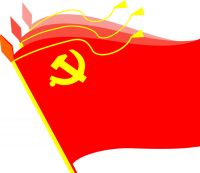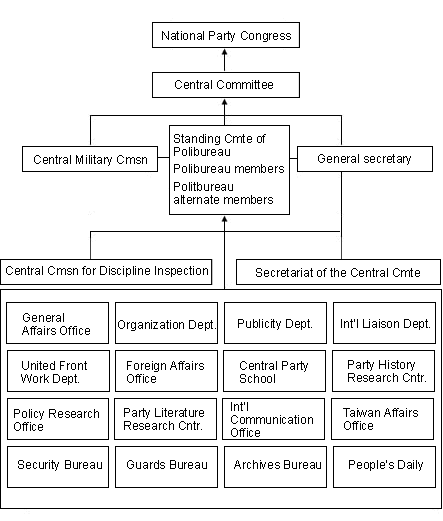Communist Party of China
The Communist Party of China was founded on July 1, 1921. It is the ruling party in China, representing the interests of the entire Chinese nation and serving as the core leading China's socialist modernization drive. By the end of 2005, the CPC had 70.8 million members. Its grassroots organizations numbered 3.52 million, including 170,000 committees, 210,000 organization departments and 3.14 million subcommittees.
After the founding of the People's Republic of China in 1949, the CPC led the Chinese people of all ethnic groups to overcome various difficulties, transforming China from a poor and backward semi-colonial and semi-feudal country into a socialist state with initial prosperity.
The CPC mainly exercises ideological and political leadership. It derives its ideas and policies from the people's concentrated will and then transforms them into state laws and decisions that are adopted by the NPC. But the CPC does not take the place of the government in the state leadership system. It conducts activities within the framework of the Constitution and laws, which it has no right to transcend. All CPC members, like other citizens in the country, are equal before the law.
In 2006, a total of 97,260 CPC members received disciplinary sanctions, accounting for 0.14 percent of the total membership. Of them, those who were punished for endangering public order, dereliction of duty, corruption and violations of financial disciplines totaled 78,980. In addition, 3,530 people suspected of committing crimes, including seven provincial- and ministerial-level officials, were handed over to prosecutors, making up 3.6 percent of total punished members. Compared with the previous year, the number of major crime-prone cases investigated by CPC commissions for discipline inspection and supervisory departments of the government at various levels declined 10.9 percent.
Renmin Ribao (People's Daily) is the organ of the CPC Central Committee, and Qiushi (Seeking Truth) is its theoretical publication
The Central Organisations of the CPC
1. The National Party Congress
The CPC's organ of supreme power, the National Party Congress, held once every five years, is convened by the Central Committee. Its functions and powers are to hear and examine the report of the Central Committee, to hear and examine the report of the Central Commission for Discipline Inspection, to discuss and decide on major issues of the Party, to revise the Party constitution and to elect the Central Committee and the Central Commission for Discipline Inspection.
2. The Central Committee
It is elected by the National Party Congress. When the National Party Congress is not in session, the Central Committee leads all the work of the Party and represents the CPC outside the Party. It is elected for a term of five years.
3. The Political Bureau, Its Standing Committee and the General Secretary
They are all elected by the plenary session of the Central Committee. When the plenum of the Central Committee is not in session, the Political Bureau and its Standing Committee exercise the functions and powers of the Central Committee. The Secretariat of the Central Committee is the administrative body of the Political Bureau and its Standing Committee. The general secretary of the Central Committee is responsible for calling sessions of both the Political Bureau and its Standing Committee, and is in charge of the work of the Secretariat of the Central Committee.
Members of the Central Military Commission of the CPC are decided on by the Central Committee.
4. Under the Central Committee of the CPC are such offices and departments as the General Affairs Office, the Organization Department, the Publicity Department, the International Liaison Department, the United Front Work Department and the Policy Research Office (See the following chart).
Local organizations of the CPC include congresses of various provinces, autonomous regions, municipalities directly under the Central Government, cities with districts, autonomous prefectures, counties (banners), autonomous counties and cities without districts as well as districts of cities which are held once every five years. The committees elected by the congresses listed above serve a term of five years. Grassroots organizations of the Party, where there are more than three full members of the Party, are set up in enterprises, rural villages, organizations, schools, research institutes, neighborhoods, the People's Liberation Army companies and other basic units.
Discipline inspection commissions are also set up at various levels of the CPC. Their major tasks are to maintain CPC's constitution and other inner Party rules and regulations, assist Party committees to strengthen the Party style, examine the implementation of the lines, policies, principles and decisions of the Party. The Central Commission for Discipline Inspection works under the Party Central Committee. The local discipline inspection commissions work under the dual leadership of the Party committees at the same level and discipline inspection commissions at the next higher level. The term of office of discipline inspection commissions is the same as that of the Party committees.
As of June 2002, the CPC had a total membership of 66.355 million belonging to about 3.5 million grassroots organizations.
The People's Daily is the paper of the CPC Central Committee while Seeking Truth is the Party's magazine.

